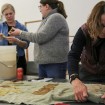Research Grading to Improve Education
Thomas Guskey is a professor of educational psychology in the UK College of Education. His research focuses on the way teachers grade and how they report that information to parents.
“The grading practices used in most schools today are really steeped in tradition. They are, in many cases, the longest held traditions operating in the schools today,” Guskey said. “There's probably no area in all of education where the gap between a knowledge-base and practice is greater than in the area of grading.”
Guskey said the key to improving grading is to specifically tie grading to what students have learned and what they’re able to do. “In that way, you’re more prescriptive in the information you offer parents, but then also more directive. If a child has particular strengths or weaknesses, parents know where to intervene to really help the child in better ways,” he said.
Listen to the podcast to hear how Guskey is working with Fayette County schools to improve grading practices.
Research Grading to Improve Education - Podcast Transcript
Have you ever wondered who was doing the research that will impact your future? The research podcast lets you met those people, and learn how the University of Kentucky is exploring and strengthening our understanding of the world through research and discovery.
Here's Alicia Gregory, director of Research Communications.
Alicia: Today we meet Tom Guskey, a professor of education psychology in the UK College of Education. His research focuses on the way teachers grade and how they report that information to parents. He begins by telling us about his first research project.
Thomas Guskey: My first formal research project, though, was when I was a graduate student at Boston College, where we were working with children in summer camp situations. Children who had diagnosed learning disabilities or autism, and we were studying how they reacted to each other and the summer camp experience there.
It was interesting because the environment was outside of school. So, it was, in many cases, a more natural environment. The students had a level of relaxation and freedom that they would not have under the structured environment of the schools. So, expression became different, and their involvement in different activities, their exchanges with adults, all became different in that sort of more naturalistic setting. So, it was great fun. We learned a lot during that time.
Alicia: So, tell me a little bit about what motivated you to go in the direction of becoming a researcher. Was it an interest you had early on? Or was it something you developed later?
Thomas Guskey: Well, I think everybody has a sort of in-born sense of curiosity. And, becoming a researcher just allows us to formalize that. To become structured and systematic in the way take our curiosity and transfer that into questions and go about seeking answers to those questions. So, it's been, kind of, a childhood dream that you're bringing to adulthood, and develop more systematic ways of doing it.
I've always been interested in the education process and teachers. And particularly how teachers change. So, that's led me to look at various variables of teachers and how they interact with their students, looking at how teachers change over the course of their careers, looking at the impact of professional development on teachers, and then how that change in them translates to change for their students. So, as they improve their instructional strategies to have a more powerful impact on students, what that does for the teacher-student relationships, and then how it affects students in terms of their confidence in themselves as learners, how they view school and learning activities, and then what they're able to do with that when they go into different and future learning situations.
Alicia: So, tell me a little bit about the most challenging aspect of your research.
Thomas Guskey: The most challenging aspect of our current research in the area of grading is that the grading practices used in most schools today are really steeped in tradition. They are, in many cases, the longest held traditions we have operating in the schools today. So, we continue to use these practices, not because their effectiveness has been investigated, but simply because we've always done it that way. As we learn more about this, we find that there's probably no area in all of education where the gap between a knowledge-base and practice is greater than in the area of grading. So, that sort of compels us to move ahead in this area, and lessen that gap. To make this knowledge-base better known, and help practitioners improve their policies and practices to fall more in line with what current evidence indicates can be beneficial for students.
Alicia: So, what are some of those strategies that have been proven to be more effective than maybe some of the ways that we've always done things?
Thomas Guskey: Well, we know, for example, that when teachers grade their students, that they- they need to grade them in terms of what they’ve learned, and what they're able to do. In other words, grades need to be based on specific learning criteria, and not based upon a child's relative standing among classmates. We typically refer to that as norm-based, or grading on the curve. And, our evidence indicates that has lots of negative consequences for students. That it really doesn't tell you anything about learning. That when students are graded on the curve, everybody could have done miserably, it's just some that are less miserably than others. It makes learning very competitive, because students have to compete against each other for the few, scarce high grades the teacher would administer.
And, we also know that that actually is detrimental to relationships between students, and detrimental to relationships of teachers to students. So, one of the primary factors that we find in this research, is that grades should be really based on learning criteria, which means that teachers have to specify what it is that they want their students to learn, and develop very good measures of student learning that they can use then to base those grades upon.
Alicia: And does that relate to what I've-- maybe a buzzword that I've heard - standards-based grading?
Thomas Guskey: Yeah, standards-based grading means that we need to break these subject areas down into various components. And so, instead of giving a single grade for Language Arts, for example, we might give a separate grade for reading, and one for writing, and one for listening, and one for speaking, and one for language skills.
And we can do that in all subject areas. So, mathematics, similarly, is broken down into, you know, problem solving, basic computations, statistics, geometric principles, algebraic expression. And, they are all important, but they're all part of mathematics.
And so, in that way, you're more prescriptive in the information you offer parents, but then, also more directive. So, if a child has particular strengths or weaknesses, parents know where to intervene, and how they intervene, to really help the child in better ways.
Alicia: So, in your experience, how many schools have kind of looked at this evidence, and are moving to change their systems of grading?
Thomas Guskey: Well, we in the United States are a bit behind the rest of the world in this area. We are more based on tradition than other developed countries- the world. So, others that are further along in the process than we are at this time. But, I think, across the United States, you see increasing emphasis on grading issues. It's the one aspect that's kind of been miss-aligned. That we're trying to be clearer about our standards for student learning, what we want students to learn and be able to do. We have made great progress in gathering information about how well students have learned those things. The one remaining element, and the biggest challenge before us, is to clarify how we communicate that information to students and parents, and the families, so they can become more involved in the process.
We have a very large program going on where we're helping Kentucky districts revise their reporting strategies. We've been working very closely with some of the Fayette County schools. Two high schools in particular, are really changing drastically their grading policies to bring them more in line with what we know is better practice. We have been working on a national level with several of the organizations; the Association for School Improvement, the Association for Curriculum and Development, National Association of Elementary and Secondary School Principals have been very involved. And then finally, with international organizations. A lot of the work that we're doing in grading has come from the State Department and our Office of Overseas Schools. So, every place we have a diplomatic mission, we have a school. And, those schools, the overseas schools, have been very interested in this work, and bringing it more in line with what we know about effective practice.
Alicia: So, tell me a little bit about your favorite part of being involved in this research.
Thomas Guskey: I find two things really stand out for me. The first is to see the difference this can bring to the relationship between schools and families. When we become better at communicating with parents, and guardians, and families about what the students are doing in school, opening up those avenues of communication, it just does remarkable things in a community. Where you see parents feeling better about contacting teachers, when good things and bad things happen, teachers being more open to relating to parents, and being more specific in those communications, so that they can target particular aspects of a child's learning experience. And, that's been just wonderful to see.
The other thing that's been really encouraging to me, is that it allows us a framework for providing collaboration between schools and education organizations. So, here in Kentucky for example, all of our schools are working with the same standards for student learning. They are all working with the same assessment system. But each school is responsible to develop its own grade and reporting system. Well, why couldn't we get some really smart people together, and think about these issues in some depth, and develop something that everybody could use. So, that kind of collaboration has been remarkable to see. And then, the strength of that in leading really systematic change, here in Kentucky and then across the nation. That's been wonderful.
Alicia: So, how has your research impacted the way you've trained students in the College of Education?
Thomas Guskey: Well, in large part, our teachers teach the way they were taught. So, I think it's incumbent upon us to model for our students the very best of practice. So, in the classes we teach in the College, we are trying increasingly to incorporate this kind of best practice into our practice, so that we are teaching students in ways we know to be more effective. We're assessing them in ways that are better, provide them with better information on their learning, tapping into higher-level skills, and then finally, grading them in ways that make sense. Being clear about the purpose of grading. That our purpose is to really communicate what students have learned and are able to do.
So, coming to class is important, but your grade isn't based on whether you come to class. Your grade is really based upon what you have learned and what you're able to do as a result of this learning experience. And, that's a big change for students. But, it's a change, I think, that's moving them in the right direction, and allows us the chance to model what we think, and hope, they will be doing for their own class when they become teachers and educational leaders.
Alicia: So, how long have you been here at UK?
Thomas Guskey: I left initially to head a research center, and did that for several years. Then returned to UK. I've had opportunities to go to other places in the world, to be visiting professors. In New Zealand and in Japan in particular. But there is a colleagueship that I love, here. The idea that we, as faculty members, support one another. There's so much to learn, not only from my colleagues in the College of Education, but have had opportunities to work with other faculty members in the Arts and Sciences, and in the med school, and in Agriculture, and Allied Health. And, I've learned so much from them and their orientations. And, hopefully I've been able to help them too. So, it's that collegial nature of the work and the support for our efforts that make this such an appealing place to be.
Alicia: So, what would you tell someone who's thinking about joining UK?
Thomas Guskey: Well, I think that I would offer them two bits of advice. The first being that you will not find another environment where there is that opportunity to work in a collaborative effort with other faculty members. I've been in the fortunate position of having offers from many different institutions during my time here at UK, and in some cases, have gone there and interviewed, and keep returning, because there is that sense here that we can share with one another, and we can work together. And there is the support for that, and an encouragement for that. Which I don't find at other institutions. And, the idea that our leadership at the department, and college, and university level really work to foster that, and support us in those efforts. So, that makes it a very positive environment as a faculty member to be able to make the kind of contribution you want, and contribute in a way that would be valuable, in an effort that supports the institution.
Thank you for listening to the Research Podcast. To subscribe to our podcasts on Soundcloud or iTunes, search University of Kentucky research media and visit our site; reveal.uky.edu.


